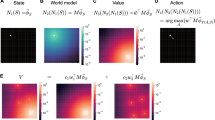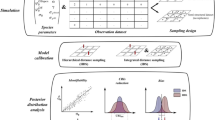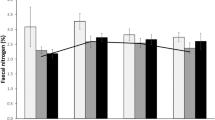Abstract
When great tits forage in an unknown environment containing two feeding places of different profitability, they first sample the two places and then exploit the more profitable one. The balance between sampling and exploitation shown by the birds is close to an optimal solution for maximising the number of food-items obtained during a feeding period.
This is a preview of subscription content, access via your institution
Access options
Subscribe to this journal
Receive 51 print issues and online access
199,00 € per year
only 3,90 € per issue
Buy this article
- Purchase on SpringerLink
- Instant access to full article PDF
Prices may be subject to local taxes which are calculated during checkout
Similar content being viewed by others
References
Krebs, J. R. & Davis, N. B. (eds) Behavioural Ecology: An Evolutionary Approach (Blackwell, Oxford, 1978).
Krebs, J. R., Ryan, J. C. & Charnov, E. L. Anim. Behav. 22, 953–964 (1974).
Krebs, J. R., Erichsen, J. T., Webber, M. I. & Charnov, E. L. Anim. Behav. 25, 30–38 (1977).
Cowie, R. J. Nature 268, 137–139 (1977).
Goss-Custard, J. D. Anim. Behav. 25, 10–29 (1977).
Cook, R. M. & Hubbard, S. F. J. Anim. Ecol. 46, 115–125 (1977).
Charnov, E. L. Theor. Populat. Biol. 9, 129–136 (1976).
Charnov, E. L. Am. Nat. 110, 141–151 (1976).
Werner, E. E. & Hall, D. J. Ecology 55, 1042–1052 (1974).
Bellman, R. Sankhyā 16, 221–229 (1956).
Barnett, V. Comparative Statistical Inference Wiley, New York, (1975).
Lindley, D. V. & Barnett, B. N. Biometrika 52, 507–532 (1965).
Mackintosh, N. J. The Psychology of Animal Learning (Academic, New York, 1974).
Jones, P. W. Biometrika 62, 523–524 (1975).
Herrnstein, R. J. & Loveland, D. H. J. exp. Analysis Behav. 24, 107–116 (1975).
Author information
Authors and Affiliations
Rights and permissions
About this article
Cite this article
Krebs, J., Kacelnik, A. & Taylor, P. Test of optimal sampling by foraging great tits. Nature 275, 27–31 (1978). https://doi.org/10.1038/275027a0
Received:
Accepted:
Issue Date:
DOI: https://doi.org/10.1038/275027a0
This article is cited by
-
Analyzing Human Search Behavior When Subjective Returns are Unobservable
Computational Economics (2024)
-
Mode switching in organisms for solving explore-versus-exploit problems
Nature Machine Intelligence (2023)
-
A Functional - Helix Conceptualization of the Emergent Properties of the Animal Kingdom: Chronoception as a Key Sensory Process
Biosemiotics (2023)
-
Thoughts from the forest floor: a review of cognition in the slime mould Physarum polycephalum
Animal Cognition (2023)
-
Sequential reversal learning: a new touchscreen schedule for assessing cognitive flexibility in mice
Psychopharmacology (2021)



